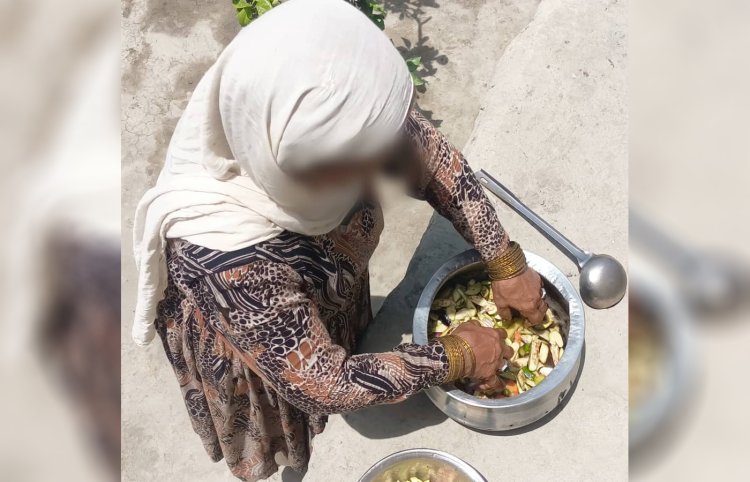In the fire of poverty: A Mother Struggling for Her Daughters’ Future

In a corner of a courtyard in Jalalabad, the capital of Nangarhar province, an aging woman stands in front of a clay oven, her face etched with sorrow. It’s the scorching heat of midday, and waves of heat ripple in every direction. Yet, this searing temperature is still no match for the pain and pressure that weigh on her heart.
This 42-year-old widow, Bakht Zamina, has taken on every kind of labor imaginable to meet the basic needs of her five daughters. Her husband, a military officer under the former republic, was killed nearly eight years ago in a bomb blast in Jalalabad’s Fourth District.
Since then, Bakht Zamina has worked hard to ensure her daughters never feel the absence of their father — a man who cherished and doted on them. After he was killed, she was left with no option but to cook bread for others just to earn enough for one meal for her family.
“When my husband was alive, we had no financial problems and lived a good life. But after he was killed, everything fell apart,” she says. “Now, I wash clothes and cook food for others just to provide for my children. Life is hard, but I will keep trying to take care of them.”
Under the previous government, she received some financial support In her husband’s name. But since the Taliban returned to power, those benefits for the families of fallen soldiers have been cut off — leaving her family’s economic condition to worsen with each passing day.
Every morning, Bakht Zamina wakes to the heavy burden of life, yet she forces herself to smile, hoping to feel a moment’s relief from the weight of hardship. Her day begins with both hope and anxiety: the hope that someone will bring her some flour to bake bread, and the anxiety of how she’ll earn just a few Afghanis to survive.
In the blistering heat, she bakes bread for five to ten households daily — though the number is never certain. For all this exhausting work, she earns only 100 to 150 Afghanis per day, barely enough to cover the basic needs of her five-member household.
“I feel happy on days when people bring me clothes to wash or bread to bake,” she says. “They pay me 4 or 5 Afghanis per piece of bread, but that’s not enough to solve our problems. I don’t have a son or any other provider. We rely only on God’s mercy.”
With tears in her eyes, she remembers the days when her husband was alive and used to care for the children. His biggest wish was to educate his daughters — a dream now shattered after girls' schools were closed.
Bakht Zamina says:
“My eldest daughter was in 10th grade, the next one in 9th, and the third and fourth were In 8th. My youngest was in 6th grade. When the schools closed, I enrolled the older three in a tailoring center. Now they know how to sew. The two youngest are studying in religious classes.”
Poverty, hardship, and the absence of a father have deeply impacted not only Bakht Zamina but also the lives of her daughters. They have been deprived of formal education for years. Still, she says, the responsibility of motherhood gives her the strength to resist.
Though she herself is uneducated — something she sees as a source of her current struggles — her meager income makes it impossible to cover education expenses for her daughters or improve their living conditions.
“I dream of seeing my daughters educated — that was also their father’s greatest wish. If girls’ schools reopen, I will endure any hardship to make sure they can study.”
Despite the weight of poverty and the relentless hardships that have taken root in her life, this widow has not given up. With all her strength, she continues to fight — so that one day, she and her daughters might enjoy a life filled with light, economic stability, and opportunity.
